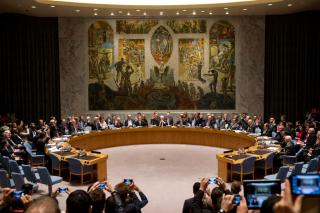Libya Alarms World in Footage of African Migrants Being Auctioned Off
By Rani Allan
The fight to end slavery worldwide has a long way to go. Recent footage released in November by CNN has shown black people being auctioned off as slaves in Libya. Reports reveal that these people being abused were migrants seeking to escape to Europe through the North African country — from countries south of the Sahara such as Nigeria, Senegal, and the Gambia. The footage has sent shockwaves around with the globe, with the United Nations Security Council issuing a condemnation and calling the event “heinous abuses of human rights.”

A CNN investigative report broke the news of the migrant slave trade in Libya to mainstream consciousness.
Recent images detail the horrific conditions African migrants face. The video followed an investigation by CNN showing that refugees and migrants in Libya are being sold for just $400, with evaluative comments made about the individuals’ physical abilities. Slave traders in Libya have taken advantage of the migrants seeking refuge in Europe, trapping them in the slave market once unable to present a smuggling payment required to reach Europe. Reports have also indicated that slaves were completely abandoned with no care once deemed “unfit” for forced labor.
The international community has commented strongly in response. All countries that mentioned the recent events expressed their intolerance of such abuse, and called for an immediate stop to it, however minimal concrete action has been taken. French President Emmanuel Macron vowed to fight slave trade networks in Libya, Nigerian President Muhammadu Buhari expressed dismay that his nationals were abused, and the United States ambassador to the U.N. Nikki Haley described the event as “shock[ing] the conscience of us all.”

The UN Security Council condemned the Libyan migrant slave trade on December 7, 2017.
Going back 90 years before today, a major international consensus was established on the need to safeguard humans from trafficking. In 1926, before even the United Nations was formed, the predecessor world organization the League of Nations passed an international treaty to eliminate slavery worldwide. The agreement is referred to as the Convention to Suppress the Slave Trade and Slavery. Further documents calling on the prevention of slavery have also been internationally-recognized, such as the Supplementary Convention on the Abolition of Slavery, passed in 1956, and a number of U.N. resolutions.
Meanwhile, longstanding measures are needed to be put into place as a preventative action against such abuses. Countries must ease the migration process for those seeking to escape unbearable conditions in their home countries, which is the fundamental reason these African migrants became trapped in the slave trade in the first place. According to a report published by the Foundation for Economic Education, restrictive immigration policies end up hurting individuals living under impoverished circumstances and increase their vulnerability to social consequences, most severely slavery and sex trafficking. Right where I am, the U.S. is in critical need of reconsidering its refugee and migrant intake policy. The country significantly lowered its monthly average of handling refugee cases to less than one hundred cases in the first six months of the Trump administration, as compared to an average of 2,400 per month during Obama’s term — a rate which even then Human Rights First described as “much too low” relative to the global need for refugee resettlement.
Estimates published by the International Organization for Migration (IOM) speak alarmingly. They show that in 2015 1,011,700 people tried to cross to Europe by sea, with as many as 3,700 dying en route. The numbers can increase or decrease each year. For example, the ratio was dramatically different in 2016 with 358,403 arriving in Europe and 4,913 dying along the way, thus indicating the unsteadiness in the migration routes.
The racial identities of the migrants is also an important for all citizens of the world to consider. As countries in the western hemisphere are continuously enacting of white-centric policies and systems of practice, black individuals including those in Africa remain under the burden of worldwide racism, which is partly to blame for the recent events in Libya. In Poland last month, a massive demonstration with up to 60,000 neo-nazis calling for an “all-white Europe.” There are explicit linkages between the racist sentiments the world observes, the global migration crisis, and the slave trade happening right now in Libya that is being “condemned” but not stopped.
Going back to Ambassador Haley’s comments regarding the slave trafficking situation: indeed, the images from Libya were shocking. However, while the situation there is horrendous, world powers such as the United States that are expressing outrage must understand that their policies impact the situation. Their restrictive migration policies are partly to blame for this situation, more or less for forcing vulnerable humans to go through dangerous smuggling channels. The recent news has visually demonstrated the need for action now more than ever, and words by themselves will not prevent black bodies from being sold on the market. Last September, the U.N. General Assembly passed Resolution A/RES/71/1, or the New York Declaration for Refugees and Migrants, which calls on the international community to rescue, receive, and host refugees and migrants seeking better life opportunities. If properly enforced by the signatory countries, such measures will ensure that individuals experiencing vulnerable conditions in their home countries get treated with respect and dignity. However, it is up to us as citizens of the world to ensure that our countries live up to the collective promise to migrants. On the occasion of International Migrants Day, we must remember those beyond our sight and take action to support them.